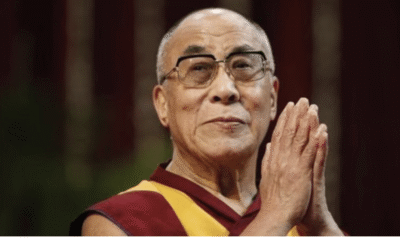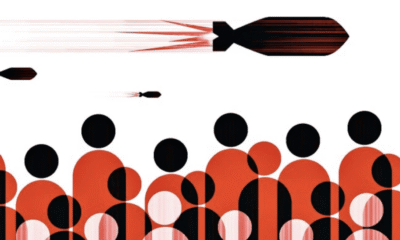
|
Getting your Trinity Audio player ready...
|
The people of J&K do not want violence. Terror is down. A nationalist, pro-development leadership is emerging
Prime Minister (PM) Narendra Modi visited Srinagar in May 2018. It was Ramzan and the Union home ministry had announced a unilateral ceasefire in the state. The prime minister was there to inaugurate several development projects.
“My appeal to these misguided youth is to return to the national mainstream, which is their own family, and participate in the development of Jammu and Kashmir,” he said in his address at the Sher-i-Kashmir International Conference Centre. “Every stone or weapon picked up by the youth of this state is only meant to destabilise their own state,” he cautioned. During an earlier visit in 2016, he had laid out his development agenda by invoking former prime minister Atal Bihari Vajpayee — “Atal Bihari Vajpayee gave the mantra — Insaniyat, Jamhooriyat, Kashmiriyat. He based Jammu&Kashmir’s development on this. We need to take it forward”.
The twin themes of peace and development have guided the PM’s Jammu and Kashmir (J&K) policies. The abrogation of Articles 370 and 35A was a corollary of that. The so-called mainstream parties in J&K were used to a different kind of emotional politics pitched around separatist agendas. They knew well that Article 370 had been hollowed out by successive governments starting with Jawaharlal Nehru. Yet, they used the chimera of special status to mislead people, breed separatism and perpetuate their rule.
One year after the abrogation of Articles 370 and 35A, one thing stands out: The separatist and emotional narrative is no longer working. When some Kashmiri politicians rue the fact that they have been made irrelevant, it should be understood that they are unable to pursue the old agendas. Also gone were the days when Opposition leaders, from N T Rama Rao to Biju Patnaik to Jyoti Basu, would stand shoulder-to-shoulder with Farooq Abdullah to form a national alliance against the Congress. Not a single political party, including the Left parties, which used to argue that Kashmiris was a separate nation, is ready to stand with them on the question of Article 370.
The political leadership in the Union Territory (UT) must realise that Naya Kashmir needs a new politics and agenda. Those who want to persist with the old agendas of separatism and rhetoric of “resistance” would do well to quit mainstream politics and choose one of the Hurriyat factions. The people of the state are not in the least interested in this language of violence and intimidation. There is almost an 80% dip in the number of violent incidents in the Union territories after the abrogation of Article 370. There has been a 40% drop in the terror incidents. There was not a single civilian casualty at the hands of the security forces in the last one year, whereas terrorists killed 22 civilians in the last six months. The security forces have succeeded in neutralising over 180 terrorists in the last year. New recruitments are low. Interestingly, even the terrorists are scared to initiate incidents. The number of attacks has come down drastically to 21 compared to 51 last year.
The people’s choice is clear — a new politics without violence and emotions — on the lines of Vajpayee’s three principles. Kashmiriyat was originally a concept denoting the state’s harmonious pluralism, Sufi, Buddhist and Shivaite tolerance, multiplicity of languages, customs, cuisines and cultures, coexisting peacefully. It was converted into a separatist political hyperbole in the 1960s. Real Kashmiriyat, together with insaniyat — humanism, and jamhooriyat — democratic politics, will form the core of the new politics.
The march in that direction has already begun. New parties and leaders are emerging with an ambition to pursue a constructive agenda of development and peace. With the extension of Article 73 and 74 of the Constitution, local bodies from panchayats upwards have secured more powers. These empowered grassroots political institutions are going to throw up a new leadership. The end of Article 370 has also ended the injustice to many sections of society. Scheduled Tribes, Scheduled Castes, women, refugees, the LGBTQ community — all of them secured their civic and political rights including reservations. The dominance of a couple of families in politics will end and a Dogra, a Pahari, and a Gujjar can aspire to the highest positions now.
Contrary to the propaganda about demographic change, the new domicile law actually safeguards the interests of the people of J&K. Under the new domicile policy, all the jobs in the state have been reserved for domiciles only. The job markets are opening up with the government announcing a recruitment for 10,000 vacancies. With over ~13,500 crore worth of memorandums of understanding already signed, private investment inflows have also started giving more boost to employment. Infrastructure projects such as roads, power projects, irrigation works and entertainment projects have picked up momentum; 50% of the Prime Minister’s Development Package of ~80,000 crore, lying unspent, is being utilised by the administration to expedite several projects for the public good.
With the delimitation commission in place and elections to the UT legislature slated post the delimitation, UT will soon return into the political leadership’s hands. Naya Kashmir is embarking on a new journey of progress, prosperity and development. Leaders with a vision for development and those fired by the nationalist mission will lead the destiny of J&K.
(The article was originally published in Hindustan Times on August 4, 2020.Views expressed are personal.)




knowledgeable Article
Excellent information. This must reach as many people in other countries including Pakistan. A strategy need to be evolved for this purpose
आपके आलेख पढ़कर संबंधित विषय के विविध आयामों से परिचय प्राप्त होता है। आभार।
It’s a good article from a person incharge of the UT- J & K. The Kashmir Valley region people should think bygones be bygones and move ahead when the Centre is extending the olive branch.